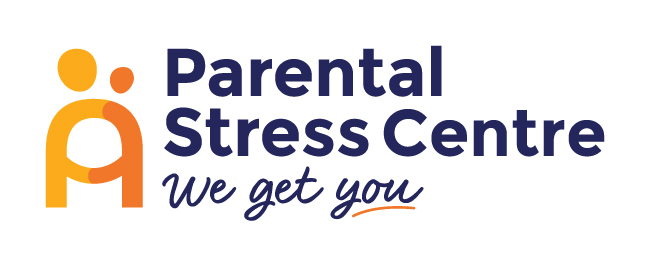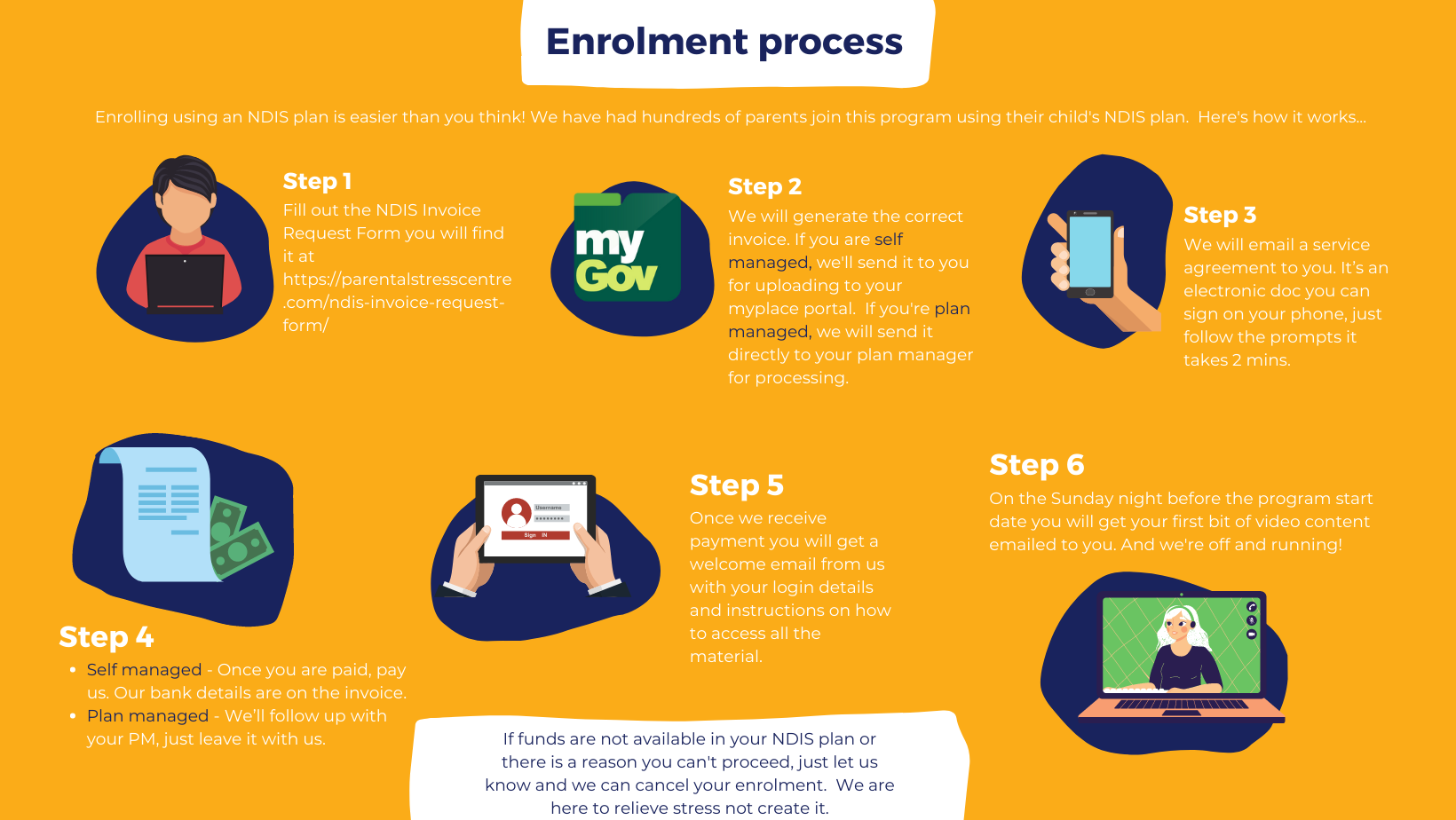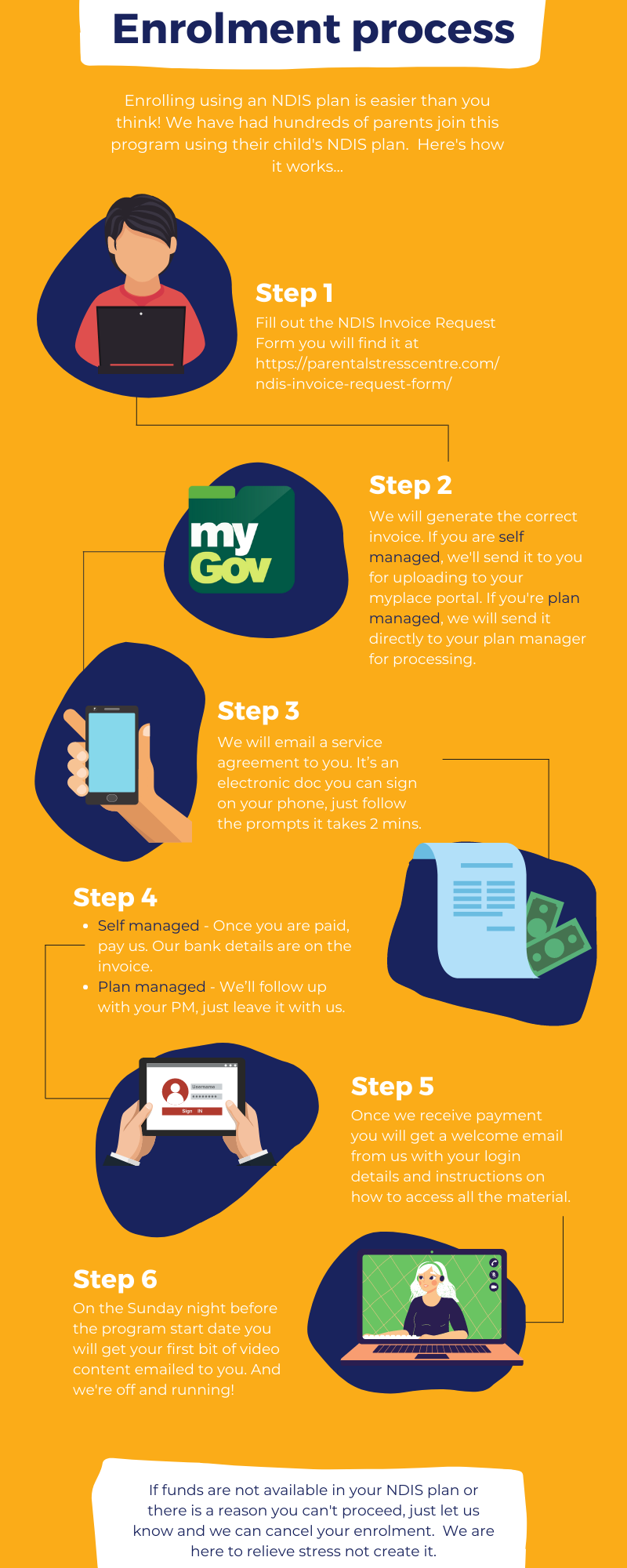
AUTISM PROGRAM
9-Week Autism Parental Stress Relief Program
Starts 18th October
Finally, A Program That Helps Both Parents & Their Autistic Child Alleviate Stress & Improve Their Mental Health.
Suitable for Parents of Autistic Children aged three years old right into adulthood.
We all know there are loads of therapies out there to help your child but where is the information that helps you?
Right here.
How will this program help me?
Here's a snapshot of what you'll learn:
- Understand how the mind and body can keep you in a heightened state of stress, depression or anxiety and how to alleviate your stress.
- What to do about marital conflict or when you and your partner are not on the same parenting page
- Gain a clear understanding of why it makes sense that your child thinks, feels and behaves the way they do, and what you can do about it.
- How to prevent and manage meltdowns and aggressive behaviours and learn co-regulation techniques.
- Step-by-step practical and psychological tools that will help manage behaviours and improve your child's emotional well-being
- Address sibling rivalry and maintain strong connections with your other children
- Finally, we'll be here 24/7 for the entire program
What's included

Daily lessons
Bite-sized lessons delivered to your inbox every day as audio and text so you can listen in the car or read

Weekly Videos
Weekly videos
approx 90 minutes long delivered every Sunday

Ask Questions Live
4 Live webinars where you can ask questions and hear from other parents having the same experiences

Private Community
A private FB group monitored 7 Days a week for parents in the same course to ask questions and get support from the PSC

Suite of 15 Courses
Lifetime access to our suite of 15 online parenting programs

Support Forever
Online counselling support by Parental Stress Centre Professional Counsellors FOREVER.
Frequently asked questions
The Parental Stress Centre has been working with parents for the last 14 years, and many of them have had children with autism. It was due to the high demand of parents asking for an autism specific program like this, that has driven the creation of this program, as well as providing parents access to all our other programs that have also been helping parents of children on the spectrum for years.
Jackie Hall, founder of The Parental Stress Centre and this course facilitator, is a qualified counsellor (comes under Allied Health Practitioner in NDIS terms) with membership with the Australian Counselling Association (ACA), who has worked in mental health for the past 12 years, including trauma, anxiety, depression, personality disorders, eating disorders, drug & alcohol addictions, and more.
Jackie has also worked in residential youth work, often working with autistic children with co-existing complex backgrounds, and applying the very strategies you will learn in this program, including therapeutic crisis intervention strategies for complex and aggressive behaviours.
As part of this course creation, Jackie Hall also became an Applied Behaviour Therapist, however soon realised that some of their approaches were not in alignment with our values and thus, we do not teach ABA principles in our courses, hence why I do not openly advertise this qualification.
Evidence based approaches and concepts that are integrated into this program are:
- Cognitive Behavioural Therapy
- Solution Focussed Therapy
- Mindfulness
- Circle of SecurityeTM concepts
- Attachment Theory
- Heart-centred Breathing Techniques
- Acceptance and Commitment Therapy (ACT)
- Narrative Therapy
- Neourscience Pyscho-education.
- Trauma Informed Approaches and Therapies
When reading the content of this course, many parents can sometimes get caught up in just the behaviour management strategies that will or won't be used, however we like clients to keep in mind that the topics of behaviour management, specifically, only form a part of this overall program (week 5 & 6).
This program is primarily about mental health - your and your child's.
Raising a child on the spectrum is incredibly stressful. You are often stressed and worried about your child, and your child is often under a lot of stress too.
This program is more a mental health improvement program than it is a child behaviour management one.
Before you even get to the child behaviour management section of this program, you will be learning to:
- Understand Anxiety and Depression in yourself
- How to provide your own emotional first aid (help yourself to help your child)
- How to parent from a place of calm and acceptance so you can help your child with their mental health.
- How to identify Anxiety and Depression in your child.
- How to help your child to think differently about the challenges they face in life to alleviate stress.
- How to observe your child's behaviour to answer the question, 'What must my child be thinking/feeling to be behaving this way?'
- By understanding the function of the behaviour, you will then set YOUR goals on what you want help your child with. (we do not tell you what goals you 'should' have for your child).
- Then in week 5 and 6 you are learning some behaviour management strategies that are about teaching your child how to reach their goals, not trying to train them out of their autism.
- Then we look at therapeutic crisis intervention techniques for dealing with aggressive behaviours.
- And the rest of the program focusses on Mindfulness strategies, relationships, time management and the impact of autism on siblings.
So you can see that this program, is not just about child behaviour management. It is a comprehensive program that looks at many different angles of raising a child on the spectrum, and is a culmination of professional mental health experience, combined with experience working with many parents and their challenges that they've faced raising their child.
The content is delivered as daily lessons from Monday through to Friday, and weekly videos delivered on Sundays, all of which can be consumed at your convenience.
You do not have to be online at any particular times to view, read or listen.
The daily lessons take on average, around 15 minutes per day and can be listened to or read.
The weekly videos take about an hour on average (some a little more and some a little less).
We deliberately do NOT give you daily lessons on Saturdays and Sundays to allow weekends as an opportunity to catch up if any lessons were missed during the week, and to give you some space to digest the week's content. It's also an opportunity to use this time to watch the weekly video too.
The only times that are set are when we have our 4 x live group webinars that are run as an optional Q&A session you can attend if you want to have a real time conversation with me. They are held fortnightly from 6th September, starting at 8.30pm AEDST (Sydney / Melbourne time. Daylight savings time applies for the first webinar only).
If you cannot attend them, support from me can also be given through the closed facebook group specifically for participants of this round of the program only and via email if you don't wish to post in the group.
There are three criteria a plan needs to meet for you to be able to use your NDIS funds for this course.
- You need to be plan managed or self-managed. (unfortunately, we cannot use NDIA managed plans).
- You need to have available funding in either your Core support section so we can put it under Parent & Carer Training, or money available under Capacity Building - Improved Daily Living (this is where most people use their funds for this program).
- Your plan must include goals for your child that are similar to emotional regulation or mental health improvement.
The two places that funding can be accessed on your plan are either, 'Parent & Carer Training' or Capacity Building - Improved Daily Living.
In your core support the line item we use is #01_741_0128_1_3 - Allied health Therapy Training.
In your Capacity Building the line item we use is #15_038_0117_1_3 - Parent & Carer Training.
If you are unsure, below is a link to a pdf you can view and print off to send to your LAC, plan manager or support co-ordinator so they can understand the program and help you to see where it best fits in the plan.
Alternatively, if you feel comfortable you can send us the plan (at [email protected]) for us to take a look at or call us to discuss it further (1300 948 608).
Click here to download an itemised costing report with line items from NDIS Pricing Arrangements & Price Limits (formerly none as NDIS Price Guide)
What if the NDIS plan is NDIA Managed?
Unfortunately to use your plan for this course when you are agency managed, we would need to be NDIS registered which we are not.
Some parents have different buckets that they can pull from that are self-managed or plan managed, which can sometimes be an option.
However, if this is not the case, then perhaps at your next review you could ask for a certain portion of your plan be dedicated to training like this so you can do our course in the future.
Some LAC's and plan managers will tell you that they cannot pay for this course until the date of commencement, as the NDIS does not pay for future dated programs.
However, although the 9 week Program itself has a start date, as part of this program all participants get immediate access to our full suite of 15 programs and online support and webinars once payment is made through our gold program.
We know that usually anything to do with the NDIS is complicated, but surprisingly, our process is easy!
All you have to do is click on the button below to fill in the NDIS Invoice Request form, and we will take care of the rest.
Here's the full process of what happens next...

No. Not at all. Many people sign up to the program in the final days, and even the first few days after the program begins, and that's completely fine.
Whenever we are close to the starting date of the course and it is unlikely that we will receive payment before we commence, here's what we do:
- If Plan managed - we simply call your plan manager and get confirmation that your invoice is being processed and that verification is enough for us to see that payment is pending and we are happy to set you up on the program right away. We don't need to wait for fund to finalise before you can get started.
- If Self-managed - Once you submit your invoice to the NDIS portal, just take a screen shot of the receipt you get afte you submit the invoice, and we will take that as verification that payment is pending and set you up on the system. If for some reason the NDIS declines your payment and we cannot help you to troubleshoot we would just withdraw you from the program. You would NOT be obligated to fund the program yourself.
You see, it's super simple. Now all you need to do is click on the button below to fill in the NDIS Invoice Request Form and we'll be able to get the ball rolling for you.
This program is designed as an 'in between session' support service.
With the increase of wait times for psychological support and the uncertainties of COVID-19 lockdowns, never before have we needed an online solution to help parents manage stressful situations.
While face-to-face psychological support will always be superior to online support, the reality is that you see your psychologist once a week, fortnight or month and then have to wait until your next session before you can troubleshoot a problem.
Because this program provides lifetime access online support from a qualified counsellor 7 days a week, you can be reaching out for help whenever you need it, and from the comfort of your own home.
In addition, you are getting this support for life, meaning you can access it through any of the stages of your child's life, using the support service as well as the 15 programs that will be available to you, to help you to navigate through the different ages and stages of your child's development.
When you have your initial plan meeting with the NDIS, you will be setting some key goals for your child to meet. NDIS funding is designed to support the achievement of these goals.
If you want to get this program fee included in your child's NDIS plan, you need to demonstrate to them how this program, along with the suite of programs (15 of them) you get as part of this fee, is going to help you to learn the skills necessary to ACHIEVE YOUR CHILDS' GOALS (this is important to the NDIS), then it will likely be funded.
Setting and meeting your child's goals are what's going to be the focus point from the NDIS perspective, so the more you can convince them that our programs are going to help you to obtain the skills to meet those goals, the better stead you'll be to get funded.
Often 'emotional regulation' is a goal that usually aligns with a program like this as I'm teaching you skills that can assist your child to regulate their emotions and by regulating your emotions, you're going to be able to regulate your child's more easily too.
FYI, your LAC (local area coordinator) may not remember to tell you this, but any specific request for funding that you make has to be submitted, so it would pay to specifically ask for this course fee to be funded somewhere in the program.
Typically, it will come under the 'Parent & Carer Training' section which is the best place to receive it. The other place is the Capacity Building - Improved Daily Living section, however if you can get the P& C Training section with funding, then the CB section can be left for direct support for your child.
Here is a link to an itemised costing report that breaks down the program and has a course overview that aligns with the emotional regulation goals I just spoke about, and also contains key line items from the current NDIS price guide where I've highlighted on page 108 and 104, the two, line items that are most popularly if you do end up using your Capacity Building section. You can download this document and take it to your LAC so they can submit your request to have this course included in your plan.
If you have the funding available under your core support budget, these line items won't apply.
Typically page 108 is where we do the most invoicing, under Line item # 15_038_0117_1_3 because most people don't know to ask for specific parent and carer training in their core budget.
Also, some LACs and plan managers may try to tell you that this program is not NDIS registered and therefore cannot be accessed. However, this only applies to NDIA managed plans.
If you are self-managed or plan managed, or you have partial plan or self-managed sections of the plan that have access to capacity building – improved daily living and adequate amounts available, and the program aligns with the child’s goals, this program can be eligible for funding.
Course Fee & Inclusions
Autism Parental Stress Relief Program with Online Support
Get access to the 9-week program. Own the program for life and help you and your child alleviate stress.
$1495
Or choose 3 x $500 monthly payments
Includes Gold Level Support Program
Access to suite of ALL 15 PSC courses AND a lifetime of support from professional counsellors 7 days a week!
Free Bonus
Included in course fee
What other parents of autistic kids have to say about our 9-week autism parental stress relief program.
"This course gives an amazing amount of information and practical support."
I feel like I have entered a whole new world of information and possibilities on how to manage the difficult situations that we are faced with every day.
I would highly recommend this program to any parents who are struggling with their own emotional responses and the emotional responses of their children.
Wendy McConaghy
12yo autistic son
"My child's meltdowns kept triggering my own meltdowns."
I was so grateful to have the tools I learnt from Jackie to help me help her to understand the reactions her behaviour was triggering in me and help me to cope better when life was not going to plan!!
Jackie's support and easy to understand and apply techniques helped me so much, and I highly recommend The Parental Stress Centre to all families!
Michelle Flanigan
Mother of 3 (autistic daughter)
"Absolutely Life Changing Program!"
The program has really made me feel validated and understood and helped me understand that I am not the only parent who has struggles with their child.
My daughter is 19 and I truly wish that I had access to such a program when she was first diagnosed.
Jackie has been a constant source of encouragement and assistance. I would say to anyone thinking about embarking on the journey – do it for yourself and do it for your family!
Simone Downie
19yo Autistic Daughter

A Breakdown on topics covered each week
This second week helps you to begin changing your mindset when faced with the challenges of family life with an autistic child, so that overwhelm doesn't become your default.
In this module you'll learn:
- Increase your distress tolerance & learn flexibility when things don’t go to plan or when your children are not co-operating.
- Learn how to find the hidden good in the bad.
- Change your thinking to reduce emotional distress
- Exercises to stay calm in the heat of a moment
- Learn how to stop taking your child's behaviour personally, so you don't get reactive
Week Three becomes a game changer. You will apply your improved thinking and mindfulness skills to ANY situation to keep you present, rational, solution focussed and out of overwhelm.
In this module you'll learn:
- Apply the 5 step TRACK Process to you and your life
- Apply the 5 step TRACK Process to working on your child’s behaviour
- Learn how to stop anxiety around the future of your child’s life
- How to stop anger and guilt in their tracks
- More tools to shift your mindset and find your calm
Sometimes behaviour management strategies can be so generic and don't work on your child because it's not factoring in why your child is behaving the way they are in the first place.
This week we begin to shift focus from yours and your child's emotions, to your child's behaviour. We start by teaching you how to answer the question, 'what must my child be thinking or feeling to be behaving this way?'
It's imperative that you understand the function of the behaviour and why it makes sense to your child, before you can assign the right behaviour management approach, making it a child-centred.
From this place of accurate understanding, you will recognise exactly what your child is needing to learn and can set clear and specific goals that you can begin working on in the home and in therapies.
In this week, we also look at the goals you want to set for yourself.
n this module you'll learn:
- What is your child’s behaviour communicating?
- Investigation tools to help you understand why your child's behaviour makes complete sense to your child
- How to set specific goals for your child that gets the heart of the real problem that's fuelling their behaviour.
- What do I want? What do I need for my life to improve?
This week is designed to give you a chance to practice what you've learnt so far and to digest the valuable information you have received.
By this week you would have learnt the tools to become more patient, change your thought processes, help your child with their mindset and start to get curious about their behaviour, understanding why they do what they do.
This week will help you to get clarity on what direction you will focus on to help your child progress and improve certain behaviours, so that in week 6, you'll know exactly how you're going to start working on to bridge the gap between where your child is at, and where you want them to be.
We also know from running this program in the past, that life can throw you many curve balls that can set you back in the program and that can be discouraging.
So this break week is also a chance for you to catch up if you need to, while still getting support from your professional counsellors when you need to ask any questions or need help to troubleshoot a situation.
While this module is not designed to replace your child's OT, or behaviour support therapist, this week is about arming you with different practical and psychological tools you can use to reach the child-centred goals you set in week four.
In this module you'll learn:
- Different strategies to teach skills & address behaviour change.
- How to create the right environment to support your Autistic Child – emotional and physical environment
- How to help your child to want to co-operate
- Breaking skills down into management steps
- How to build on strengths your child already has
- Creative ways to help your child to learn
- Helping your autistic child to handle anxiety.
- Learn how to teach all your children a healthy mindset and positive self-worth they will adopt for life.
- Knowing how and when to use rewards, consequences, give choices, when to be flexible and when/how to be consistent.
Carrying on from the week before, you will continue to learn child behaviour strategies by focussing specifically on how to handle meltdowns and aggressive, anger-related behaviours.
In this module, you'll also learn:
- The difference between a tantrum and a meltdown
- How to recognise the signs your child is about to escalate
- How to prevent an escalation
- How to support your child and reduce the length of the outburst
- What to do to minimise violence and distruction during an escalation
- How to communicate with your child during an escalation / meltdown
- How to repair your relationship or debrief with your child after an escalation / meltdown
This week we turn our attention towards the quality of your relationship with other members of your family - your other children and marital relationships.
In this module, you'll learn:
- How to alleviate guilt and pressure related to raising your other non-autistic children.
- How to deal with Sibling Rivalry
- What to do when your partner is not on the same page as you.
- How to take care of your marital relationship during challenging times.
- To understand how men and women think and how the way we each communicate can cause unnecessary problems in a relationship
This final week will bring you tools to stay present in each moment, manage your time so you can fit in everything you need to and want to do without stress and give you some final pointers on how you can bring everything together that you have learnt over the last 9 weeks.
In this module, you'll learn:
- Mindfulness tools to keep you present and in the moment (instead of focussing on past ‘failures’ and future worries that haven’t happened yet).
- How to manage your time effectively to include everything you want to do and everything you need to do.
- Final lessons on how to deal with the continual highs and lows of life and not losing your identity within it all.
You are never alone in this program! For the entire 9 weeks you will be receiving professional counselling support by way of our Closed Facebook Group, Plus 4 x Live Fortnightly webinars with Jackie Hall so you can get any of your questions asked along the way.
That means whenever you get stuck with any situation you're facing, or you just need support for a rough day, we will be there for you alongside a group of parents all learning through this program too.
That isolation you often feel as you're travelling along this journey? That won't happen by being a part of the PSC Family!